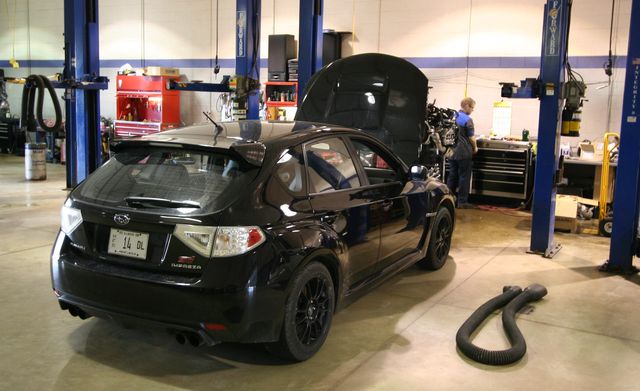Blocked Exhaust Symptoms : Recognize the Hidden Indications
Blocked exhaust symptoms manifest in decreased engine performance and emission issues, caused by restricted airflow in the exhaust system. This can lead to reduced power, increased fuel consumption, and a loud exhaust noise.
Additionally, the engine may experience misfires, overheating, or a strong smell of exhaust fumes.
Hidden Indications Of A Blocked Exhaust System
The symptoms of a blocked exhaust system can often go unnoticed until it becomes a major issue. Diminished engine performance is one of the hidden indications of a blocked exhaust. When the exhaust system becomes restricted, it hampers the flow of exhaust gases, leading to a decrease in engine power. Another sign to watch out for is increased fuel consumption. A blocked exhaust can force the engine to work harder, burning more fuel than necessary. Additionally, you may notice exhaust odor inside the vehicle. If the exhaust gases are unable to properly exit the system, they can seep back into the car, causing an unpleasant smell. It’s important to keep an eye out for these symptoms as a blocked exhaust can lead to further damage if not addressed promptly.
Common Signs Of A Blocked Catalytic Converter
Blocked Exhaust Symptoms
Common Signs of a Blocked Catalytic Converter:
– Check Engine Light Activation: One of the most common indicators of a blocked catalytic converter is when the check engine light comes on. This warning light may illuminate on your vehicle’s dashboard, indicating that there is a problem with the exhaust system. – Reduction in Engine Power: A blocked catalytic converter can significantly impact the performance of your vehicle. You may experience a noticeable decrease in engine power, making it difficult for your car to accelerate or reach high speeds. – Loud Rumbling Noise from the Exhaust: Another sign of a blocked catalytic converter is a loud rumbling noise coming from the exhaust system. This noise can be caused by the backpressure built up due to the blockage, resulting in abnormal sounds. If you notice any of these symptoms, it is crucial to have your exhaust system inspected and repaired by a professional mechanic. Failure to address a blocked catalytic converter can lead to further damage to your vehicle’s engine and decrease its overall performance.
Identifying Symptoms Of A Blocked Muffler
A blocked muffler can cause several symptoms, making it important to identify and address the issue promptly. One of the telltale signs of a blocked muffler is abnormal exhaust noise. If you hear a deep, loud rumbling sound or metallic rattling, there’s a good chance the muffler is blocked. Another symptom is vibrations and shaking. A blocked muffler can cause the engine to vibrate excessively, which can be felt throughout the vehicle. Additionally, poor acceleration can indicate a blocked muffler. If you notice a significant decrease in power when accelerating, it could be due to restricted exhaust flow.

Credit: www.artplumbingandac.com
Warning Signs Of A Blocked Exhaust Pipe
Blocked exhaust symptoms can present a number of warning signs to vehicle owners. One common indication is white smoke emanating from the exhaust. This smoke is typically caused by coolant or water entering the combustion chamber and mixing with fuel or engine oil. Another symptom to watch out for is a strong smell of exhaust fumes. If you notice a pungent odor inside or outside the vehicle, it could be a sign of a blocked exhaust pipe. Additionally, engine misfiring can occur when the exhaust system is partially or completely blocked. This happens because the engine does not receive proper airflow, causing a disruption in the combustion process. In such cases, it is important to address the issue promptly to prevent further damage to the vehicle.
Key Indications Of A Blocked Diesel Particulate Filter
Key indications of a blocked diesel particulate filter include frequent regeneration cycles, decreased engine efficiency, and black smoke from the exhaust. The diesel particulate filter (DPF) is designed to trap harmful particles in the exhaust system before they are released into the atmosphere. Over time, the filter can become clogged with soot and other debris, causing it to operate less efficiently. One major symptom of a blocked DPF is the need for the regeneration process to occur more frequently. During regeneration, the trapped particles are burned off to clear the filter, but if it happens too often, it may indicate a blockage. Additionally, engine efficiency can be noticeably reduced, resulting in poor performance and increased fuel consumption. Another telltale sign of a blocked DPF is the presence of black smoke from the exhaust, indicating that the trapped particles are not being properly filtered. It is important to address these symptoms promptly to avoid further damage to the engine and to ensure efficient vehicle operation.
Hidden Symptoms Of A Blocked Exhaust Manifold
Blocked exhaust symptoms can often go unnoticed, but they can lead to serious issues with your vehicle if left untreated. One of the hidden symptoms of a blocked exhaust manifold is poor fuel economy. When the exhaust is blocked, the engine has to work harder, resulting in increased fuel consumption.
Another symptom of a blocked exhaust manifold is engine overheating. The blocked exhaust causes a buildup of heat in the engine, leading to overheating and potential damage to the engine components.
A cracked exhaust manifold can also be a sign of blockage. A cracked manifold can allow debris, such as rust or exhaust gases, to enter the exhaust system, leading to a blockage over time.
It is important to address any symptoms of a blocked exhaust manifold promptly to prevent further damage to your vehicle. Regular maintenance and inspection can help identify and resolve any issues with the exhaust system before they become major problems.
Inspecting The Catalytic Converter
Inspecting the catalytic converter is an important step in diagnosing blocked exhaust symptoms. To visually inspect the converter, it needs to be removed first. Carefully inspect the converter for any physical damage or blockages. Look for any signs of cracks, dents, or bends in the body of the converter. Check for debris or buildup inside the converter. To do this, gently shake the converter and listen for any rattling sounds. These could indicate a damaged or loose catalytic substrate inside, which can cause blockages.
Examining The Muffler
Examining the Muffler:
Inspecting the muffler for rust or corrosion is crucial to determine whether it is functioning optimally. Rust or corrosion can occur due to exposure to moisture, salt, and road debris. Signs of rust or corrosion could indicate a damaged muffler that needs replacement.
Another important aspect to check is the presence of holes or leaks in the muffler. These can occur due to wear and tear, impact damage, or improper installation. Holes or leaks can result in loud noises, decreased engine performance, and even emissions issues. Subsequently, prompt repairs or replacements are necessary to maintain the exhaust system’s efficiency.
Additionally, it is vital to verify the proper functioning of the muffler baffles. Baffles are internal components that reduce noise and help control backpressure. If the baffles are damaged or worn out, it can lead to louder exhaust noises and decreased performance. Ensuring that the baffles are intact and functioning correctly is essential for the overall performance of the exhaust system.
Assessing The Exhaust Pipe
Inspecting the pipe for dents or physical damage is crucial. Dents can disrupt the smooth flow of exhaust gases, which may eventually lead to engine performance issues. Check the entire length of the pipe carefully to identify any dents or signs of physical damage.
Next, you should inspect the pipe for any signs of loose or broken connections. A disconnected or broken pipe can result in exhaust leaks, causing excessive noise and decreased engine efficiency. Make sure all connections are secure and intact.
In addition, it’s important to clear any debris or blockages in the pipe. Over time, debris like soot, carbon deposits, or rust can accumulate inside the exhaust system. This buildup restricts the flow of exhaust gases, leading to reduced performance. Clearing out any blockages ensures proper airflow and optimal engine function.
Cleaning The Diesel Particulate Filter
One of the common symptoms of a blocked exhaust system is reduced engine performance. Cleaning the diesel particulate filter (DPF) can help to improve the overall performance and efficiency of your vehicle. The DPF is responsible for trapping and removing particulate matter from the exhaust gases produced by a diesel engine.
To effectively clean the DPF, it is important to understand the regeneration process. During normal operation, the DPF will accumulate soot and other particulate matter over time. The regeneration process involves burning off the accumulated soot, turning it into ash.
There are a few methods for cleaning the DPF. Performing regular long drives at high speeds can help to aid in the regeneration process. This is because higher exhaust temperatures are generated during extended and continuous driving, which can facilitate the burning off of the accumulated soot.
Another method is to utilize cleaning additives specifically designed for DPFs. These additives can be added to the fuel tank and can aid in the regeneration process by reducing the ignition temperature of the soot particles.
If the DPF is heavily blocked, it may require professional DPF cleaning services. These services use specialized equipment and techniques to effectively clean the DPF and restore its optimal performance.
Regular maintenance and cleaning of the DPF can help to prevent blockages and ensure the proper functioning of your vehicle’s exhaust system.
Maintaining The Exhaust Manifold
The exhaust manifold plays a crucial role in the proper functioning of a vehicle’s exhaust system. Regularly checking and tightening manifold bolts is essential to ensure that the manifold remains securely attached to the engine. Loose bolts can lead to exhaust leaks, which can result in decreased engine performance and increased emissions.
In addition to checking the bolts, it is important to inspect the manifold for cracks or leaks. These issues can develop over time due to the constant exposure to high temperatures and vibrations. If any cracks or leaks are found, they should be addressed promptly to prevent further damage to the manifold and the exhaust system as a whole.
Maintaining the exhaust manifold is a critical aspect of keeping your vehicle running smoothly and efficiently. By regularly checking and tightening manifold bolts and addressing any cracks or leaks, you can ensure that your exhaust system is functioning properly and avoid potential issues down the road.
Frequently Asked Questions On Blocked Exhaust Symptoms
What Happens If Your Exhaust Is Blocked?
A blocked exhaust can cause harmful fumes to accumulate in your vehicle, leading to engine damage and poor performance. It can also result in increased fuel consumption and overheating. Regular maintenance and inspections can help prevent blockages and keep your vehicle running smoothly.
How Do You Unclog An Exhaust?
To unclog an exhaust, follow these steps: 1. Park the vehicle on a flat surface and let the engine cool down. 2. Locate the exhaust pipe underneath the car. 3. Inspect for any obstructions like debris or objects. 4. Use a wire brush or coat hanger to gently remove the clog.
5. Start the car and check if the exhaust is clear.
Can You Drive With A Clogged Exhaust?
Yes, driving with a clogged exhaust can have serious consequences. It can reduce engine performance, increase fuel consumption, and potentially damage the engine. It’s important to address a clogged exhaust promptly to avoid these issues and ensure safe driving.
What Are The Symptoms Of A Bad Resonator?
Symptoms of a bad resonator may include louder exhaust noise, reduced engine power, vibrations, and a decrease in fuel efficiency.
Conclusion
Recognizing and addressing blocked exhaust symptoms is crucial for maintaining the health and performance of your vehicle. By understanding the signs, such as reduced power, increased fuel consumption, and unusual odors, you can take proactive measures to prevent further damage and ensure a smooth and efficient driving experience.
Regular maintenance and inspection of your exhaust system will significantly contribute to the longevity and safety of your vehicle, so don’t ignore any potential issues that may arise.







